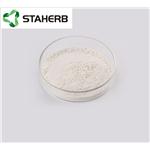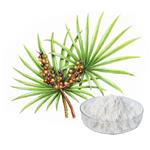L(+)-Rhamnose monohydrate: origin, activities and applications
Nov 16,2023
General Description
L(+)-Rhamnose monohydrate is a natural monosaccharide found in plants and produced through microbial fermentation. It is commonly used in the food, pharmaceutical, and cosmetics industries. It acts as a prebiotic, promoting beneficial gut bacteria and improving gut health. It also possesses antimicrobial properties, inhibiting the growth of pathogenic bacteria. Additionally, it has shown anti-inflammatory and antioxidant activities, making it potentially useful in managing chronic inflammatory diseases. In the food industry, it serves as a flavor enhancer and sweetening agent, while in pharmaceuticals, it can be used in antimicrobial drugs. In cosmetics, it acts as a moisturizer and skin conditioning ingredient. Overall, L(+)-Rhamnose monohydrate exhibits diverse biological activities and finds applications in various industries.

Figure 1. L(+)-Rhamnose monohydrate
Origin
L(+)-Rhamnose monohydrate is a natural monosaccharide that is found in various plant sources such as buckwheat, ginseng, and quince. It is also a component of some bacterial cell walls and lipopolysaccharides. The extraction of L(+)-Rhamnose monohydrate from plant sources involves several steps. First, the plant material is crushed and extracted with hot water or ethanol to obtain a crude extract. The crude extract is then purified using various techniques such as chromatography and crystallization to isolate L(+)-Rhamnose monohydrate. In addition to plant sources, L(+)-Rhamnose monohydrate can also be produced through microbial fermentation. This involves the use of microorganisms such as Pseudomonas aeruginosa and Rhizobium leguminosarum which convert glucose into L(+)-Rhamnose monohydrate. L(+)-Rhamnose monohydrate is used in various industries such as food, pharmaceuticals, and cosmetics due to its unique properties. In the food industry, it is used as a natural sweetener and flavor enhancer. In the pharmaceutical industry, it is used in the production of antibiotics and other drugs. In the cosmetics industry, it is used as an emollient and humectant. In conclusion, L(+)-Rhamnose monohydrate is a natural monosaccharide that can be obtained from plant sources and through microbial fermentation. 1
Activities
L(+)-Rhamnose monohydrate is commonly found in plant-derived foods such as fruits and vegetables, and has been shown to possess various health benefits. One of the primary activities of L(+)-Rhamnose monohydrate is its prebiotic effect. As a non-digestible carbohydrate, it acts as a food source for beneficial gut bacteria, promoting their growth and proliferation. This leads to an increase in beneficial short-chain fatty acid production, which has been linked to numerous health benefits, including improved gut health, immune function, and reduced inflammation. In addition to its prebiotic activity, L(+)-Rhamnose monohydrate has been shown to possess antimicrobial properties. Studies have demonstrated its ability to inhibit the growth of various pathogenic bacteria, including Staphylococcus aureus and Escherichia coli, making it a potential candidate for use as a natural preservative in food and personal care products. Furthermore, L(+)-Rhamnose monohydrate has been studied for its anti-inflammatory and antioxidant activities, with promising results. It has been shown to reduce oxidative stress and inflammation in various cell types, suggesting its potential use in the management of chronic inflammatory diseases. Overall, L(+)-Rhamnose monohydrate exhibits a myriad of biological activities, making it a promising candidate for various therapeutic applications. 2
Applications
L(+)-Rhamnose monohydrate is a naturally occurring sugar that has gained significant attention in various applications. With its unique properties and diverse functionalities, it has found widespread use in several industries. In the food and beverage industry, L(+)-Rhamnose monohydrate is utilized as a flavor enhancer and sweetening agent. Its sweet taste, which is approximately half as sweet as sucrose, allows for reduced sugar content while maintaining desirable sweetness. Additionally, it acts as a stabilizer and emulsifier in various food products. L(+)-Rhamnose monohydrate also exhibits potential in the pharmaceutical field due to its antimicrobial properties. It has been studied for its ability to inhibit the growth of certain bacteria and fungi. This makes it a potential candidate for the development of antimicrobial drugs and topical treatments. Furthermore, L(+)-Rhamnose monohydrate has shown promise in cosmetic formulations. Its moisturizing and skin conditioning properties make it a valuable ingredient in skincare products. It helps improve skin hydration, reduce inflammation, and promote wound healing. In summary, L(+)-Rhamnose monohydrate has applications in the food and beverage industry as a sweetener and flavor enhancer, in the pharmaceutical field as an antimicrobial agent, and in cosmetics as a moisturizing and skin conditioning ingredient. 3
Reference
1. Pan L, Zhang Y, Zhang F, Wang Z, Zheng J. α-L-rhamnosidase: production, properties, and applications. World J Microbiol Biotechnol. 2023 May 10;39(7):191.
2. Hosseini E, Grootaert C, Verstraete W, Van de Wiele T. Propionate as a health-promoting microbial metabolite in the human gut. Nutr Rev. 2011 May;69(5):245-258.
3. Li S, Chen F, Li Y, Wang L, Li H, Gu G, Li E. Rhamnose-Containing Compounds: Biosynthesis and Applications. Molecules. 2022 Aug 20;27(16):5315.
- Related articles
- Related Qustion
- The uses of L(+)-Rhamnose monohydrate Aug 26, 2019
L(+)-Rhamnose monohydrate is a deoxy sugar found in plants and bacteria. It is a structural component of plant cell walls that is naturally found in the L configuration.
1-Adamantanamine hydrochloride is a synthetic organic compound with highly soluble, relatively non-toxic, and biologically stable....
Nov 16,2023API1H,1H,2H,2H-Perfluorodecyltriethoxysilane offers unique surface modification properties, including hydrophobicity, adhesion, low surface energy, and exceptional stability.....
Nov 16,2023APIL(+)-Rhamnose monohydrate
10030-85-0You may like
L(+)-Rhamnose monohydrate manufacturers
- L(+)-Rhamnose monohydrate
-

- $0.00 / 1kg
- 2024-06-03
- CAS:10030-85-0
- Min. Order: 1kg
- Purity: 0.99
- Supply Ability: 50000kg
- L-rhamnose Monohydrate
-

- $10.00 / 1kg
- 2024-06-03
- CAS:10030-85-0
- Min. Order: 1kg
- Purity: 98%HPLC
- Supply Ability: 98%HPLC
- L-rhamnose Monohydrate
-

- $10.00 / 1kg
- 2024-06-03
- CAS:10030-85-0
- Min. Order: 1kg
- Purity: 98%HPLC
- Supply Ability: 10000





